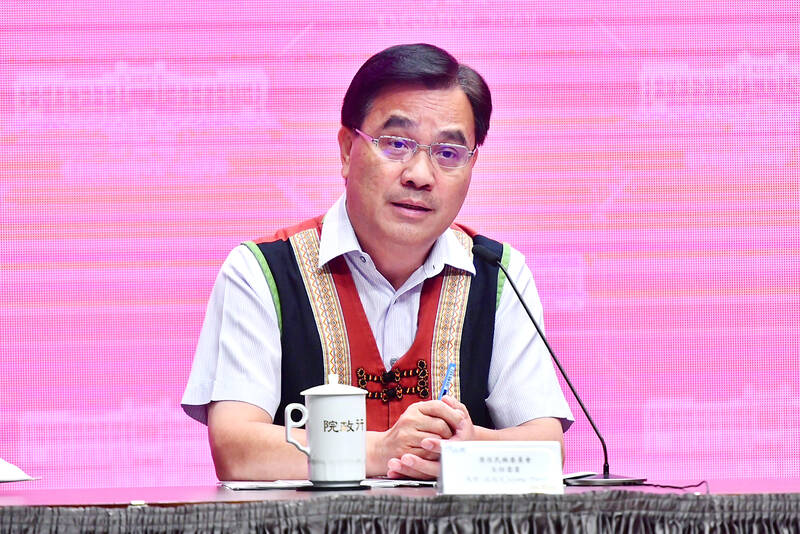The Executive Yuan yesterday approved amendments to make it easier for Taiwanese to be legally recognized as a person of indigenous descent and open more public sector jobs for affirmative action targeting indigenous Taiwanese.
The Status Act for Indigenous Peoples (原住民身分法) stipulates that children from marriages with one indigenous parent can obtain indigenous status after taking an indigenous-language name, the Council of Indigenous Peoples said.
The children of a mixed marriage can claim indigenous status after including the indigenous parent’s traditional name in their own, meaning they can keep a Mandarin Chinese name, the council’s proposed changes said.

Photo courtesy of the Executive Yuan
The changes would stipulate that a person of indigenous descent raised in a non-indigenous adoptive family can obtain indigenous status by the same method without being constrained by regulations concerning surname changes in the Civil Code, the council said.
In addition, Taiwanese who voluntarily relinquish their indigenous status can regain it once in a lifetime, it said.
Under the Indigenous Peoples Employment Rights Protection Act (原住民族工作權保障法), government offices have a quota for indigenous employees to meet or they must pay an exemption fee, it said, adding that this only applied for menial jobs.
The amendments to the law would mandate government offices to fill indigenous quotas across all categories of work, the council said.
However, government offices that have a valid reason for not meeting the quota would not have to pay an exemption fee, it said, adding that what constitutes a valid reason would be determined by an appropriate regulatory authority.
The proposed changes mandate that central government offices headquartered in an indigenous region must meet a 3 percent quota of indigenous employees, which is the proportion of indigenous people in the nation’s population, the council said.
The amendments showed that central government offices and agencies, public schools and state-owned enterprises headquartered in indigenous areas must meet a 3 percent indigenous quota in hiring, it said.
That figure was determined by the proportion of indigenous people in the nation’s population, it added.
For local government offices in an indigenous region, their quota is to be decided by the proportion of the indigenous population residing in their jurisdiction, it said.
The exemption fee to be paid by government contractors would be calculated according to a reduced rate, as the current formulae were taken down by the nation’s constitutional judges, it said.
The changes to the indigenous identity rules are made to create an objective and consistent standard for laying claims to indigenous status, said Yapasuyongu Poiconu, director of the council’s Comprehensive Planning Department.
The council hopes the amendment would protect the right to identity while emphasizing people recognized as members of an indigenous group have a responsibility to the continuance of its traditional language and culture, he said.
Additional reporting by CNA

The Grand Hotel Taipei on Saturday confirmed that its information system had been illegally accessed and expressed its deepest apologies for the concern it has caused its customers, adding that the issue is being investigated by the Ministry of Justice Investigation Bureau. The hotel said that on Tuesday last week, it had discovered an external illegal intrusion into its information system. An initial digital forensic investigation confirmed that parts of the system had been accessed, it said, adding that the possibility that some customer data were stolen and leaked could not be ruled out. The actual scope and content of the affected data

DO THEY BITE IT? Cats have better memories than people might think, but their motivation is based entirely around the chance of getting fed Cats can remember the identity of the people who fed them the day before, Taipei-based veterinarians said on Friday, debunking a popular myth that cats have a short memory. If a stray does not recognize the person who fed them the previous day, it is likely because they are not carrying food and the cat has no reason to recognize them, said Wu Chou Animal Hospital head Chen Chen-huan (陳震寰). “When cats come to a human bearing food, it is coming for the food, not the person,” he said. “The food is the key.” Since the cat’s attention is on the food, it

Taiwan must act to preempt potential Section 301 investigations as US President Donald Trump moves to a new tariff strategy, following a US Supreme Court ruling that voided tariff measures, an academic said yesterday. Countries running the largest trade surpluses with the US face a growing likelihood of Section 301 investigations, Chung-Hua Institution for Economic Research president Lien Hsien-ming (連賢明) said. Section 301 refers to a provision of the Trade Act of 1974 that allows Washington to impose retaliatory tariffs over perceived unfair trade practices, including the running of large trade surpluses. Because Taiwan has become the fourth-largest source of the US’ trade

People hold incense and pray with offerings in front of Taipei’s Kuanghwa Market yesterday. The fifth day of the Lunar New Year is traditionally about welcoming the God of Wealth, during which companies and shops set off firecrackers to celebrate their reopening and pray for good business in the new year.